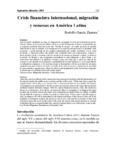
Please use this identifier to cite or link to this item:
http://ricaxcan.uaz.edu.mx/jspui/handle/20.500.11845/162| Title: | Crisis financiera internacional, migración y remesas en América Latina |
| Authors: | García Zamora, Rodolfo |
| Issue Date: | Sep-2010 |
| Publisher: | Instituto de Investigaciones Económicas y la Facultad de Economía, Universidad Nacional Autónoma de México |
| Abstract: | Bajo el modelo neoliberal en curso, la migración ha aumentado al ritmo de la desarticulación del mercado interno, de la economía pública y de la economía del bienestar. Si bien se argumentaba que la migración resultaba funcional como una “válvula de escape”, se evadía reconocer la premisa fundamental de que el aumento de la emigración en la región era proporcional a la profunda crisis económica y social derivada de los cambios estructurales del modelo neoliberal. Con la crisis económica y financiera actual, este modelo está mostrando todas sus consecuencias. Aunque el efecto percibido hasta el momento sobre los receptores de remesas es bastante complejo, la situación económica ha llevado a que inmigrantes reconsideren si están dispuestos a hacer frente a las condiciones más difíciles o si prefieren volverse a casa. Está claro que el grado de caída de las remesas se verá afectado por la duración y profundidad de la crisis financiera y por la capacidad de los trabajadores migrantes, de los sectores en que se desempeñan y de las economías de sus países huéspedes para hacer frente a tormenta. En medio de la crisis económica y financiera, la necesidad de tomar medidas urgentes para mitigar los efectos más depredadores sobre las familias migrantes ha abierto una viva polémica sobre que camino seguir. |
| Description: | Under the current neoliberal model, immigration has increased in lockstep with the disarticulation of the internal market, the public-sector economy and the welfare state. While many have argued that migration had a role to play as an “escape valve”, a fundamental premise was omitted: the increase in immigration was proportional to the deep social and economic crises in the region that arose from neoliberal inspired structural changes. With the current financial-economic crisis, this model has shown its consequences. Even though its perceived effect on recipients of remittances has been complex, the economic situation has made many immigrants reconsider if they are willing to muddle through difficult situations or whether it is better to return home. What is clear is that the degree to which remittances fall will be determined by the duration and depth of the financial crisis and by the capability of immigrant workers, the sectors in which they work and the economies of their host countries to brave the storm. In the midst of the crisis, the need to take urgent measures to mitigate its harshest effects on migrant families has opened an intense debate as to which policy route to take. |
| URI: | http://hdl.handle.net/20.500.11845/162 https://doi.org/10.48779/jbtp-5h33 |
| ISSN: | 1870-1442 |
| Other Identifiers: | info:eu-repo/semantics/publishedVersion |
| Appears in Collections: | *Documentos Académicos*-- UA Estudios del Desarrollo |
Files in This Item:
| File | Description | Size | Format | |
|---|---|---|---|---|
| Garcia-Zamora - 2010 - Crisis financiera internacional, migración y remesas en América Latina.pdf | Artículo Final | 349,89 kB | Adobe PDF |  View/Open |
This item is licensed under a Creative Commons License
